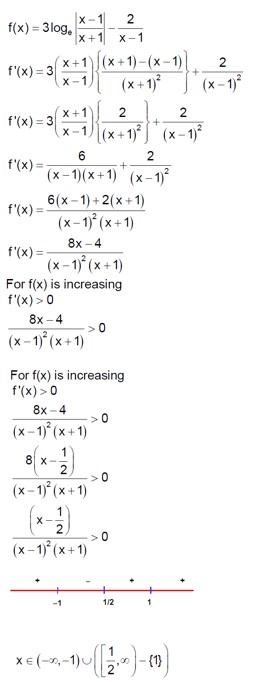Let f : R → R satisfy the equation f(x+y) = f(x).f(y) for all x,y ∈ R and f(x) ≠ 0 for any x ∈ R. If the function f is differentiable at x = 0 and f'(0) = 3, then limₕ→₀ (1/h)(f(h)-1) is equal to......
Let f : R → R satisfy the equation f(x+y) = f(x).f(y) for all x,y ∈ R and f(x) ≠ 0 for any x ∈ R. If the function f is differentiable at x = 0 and f'(0) = 3, then limₕ→₀ (1/h)(f(h)-1) is equal to......
The functional equation f (x+y) = f (x)f (y) implies f (x) = a? for some constant a.
Then f' (x) = a? ln (a).
Given f' (0) = 3, we have a? ln (a) = 3 ⇒ ln (a) = 3 ⇒ a = e³.
So, f (x) = e³?
We need to evaluate the limit: lim (x→0) (f (x)-1)/x = lim (x→0) (e³? -1)/x.
Using the standard limit lim (u→0) (e?
Similar Questions for you
f (x) is an even function
So, f (x) has at least four roots in (-2, 2)
So, g (x) has at least two roots in (-2, 2)
now number of roots of f (x)
It is same as number of roots of will have atleast 4 roots in (-2, 2)
Let
So, f(x) = x
Now,
f(x) = αx – b
option (D) satisfies
f (x) = f (6 – x) Þ f' (x) = -f' (6 – x) …. (1)
put x = 0, 2, 5
f' (0) = f' (6) = f' (2) = f' (4) = f' (5) = f' (1) = 0
and from equation (1) we get f' (3) = -f' (3)
So f' (x) = 0 has minimum 7 roots in
h (x) = f' (x) . f' (x)
h' (x) = (f' (x)2 + f' (x) f' (x)
h
1 + x? - x? = a? (1+x)? + a? (1+x) + a? (1+x)² . + a? (1+x)?
Differentiate
4x³ - 5x? = a? + 2a? (1+x) + 3a? (1+x)².
12x² - 20x³ = 2a? + 6a? (1+x).
Put x = -1
12 + 20 = 2a? ⇒ a? = 16
Taking an Exam? Selecting a College?
Get authentic answers from experts, students and alumni that you won't find anywhere else.
On Shiksha, get access to
Learn more about...

Maths Continuity and Differentiability 2025
View Exam DetailsMost viewed information
SummaryDidn't find the answer you were looking for?
Search from Shiksha's 1 lakh+ Topics
Ask Current Students, Alumni & our Experts
Have a question related to your career & education?
See what others like you are asking & answering

